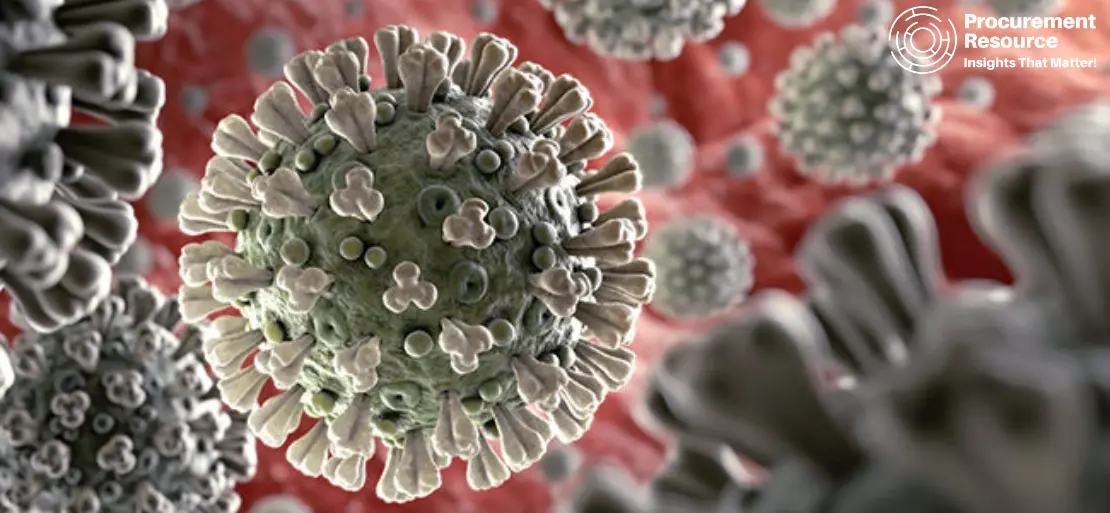Impact of COVID-19 on Global Chemical Supply Chain

With China being a significant producer and supplier of most of the raw materials and components to the world, the international supply chain has received more than its fair share of shocks due to the Coronavirus outbreak. COVID-19, which started from Wuhan, and first impacted China has reached almost every part of the world and till now has impacted each and every sector. The global chemical industry is no different and is currently experiencing supply chain disruptions. As China is the major producer for most of the chemicals, which further serve as the raw materials in the manufacture of other products, the supply chain and procurement has taken a severe hit.
Currently, manufacturers in the chemical industry are trying to maintain a high level of operational productivity to stay competitive in the sector. Despite all this, the restrictions on shipping and industrial production have adversely affected the chemical supply chain. Several crucial high-capacity Chinese manufacturing plants have been forced to lower their manufacturing run by 25% to 30%, along with some plants delaying their restart.
Thus, the outbreak of the noble Coronavirus pandemic has led numerous firms to reconsider their investments across Asian supply chains. As the governments and different sectors battle to hold the spread of the virus, it has been observed that the factors like logistics issue, shortage of staff, and rising inventories are primarily forcing chemical companies to cut their productions.
What has made the condition worse are the factors like the shortage of labourers, lack of drivers, and roadblocks. As now-a-days companies majorly rely on migrant workers to carry out labour intensive operations, this has put production activities in an extremely vulnerable situation.
In the chemical industry, weakened demand has also stopped the export of integrated chlor-vinyl manufacturers by South Korea, Japan, as well as by Taiwan into China. Further, the demand for PVC is expected to decrease by a significant value due to a decrease in demand for its end use products.
Most lubricant brands, on the demand side, have decided to delay their return to manufacturing until their downstream end users don't return to work. Moreover, the demand from lubricant makers is expected to remain bearish amid the COVID-19 outbreak, and it is unlikely to recover in the short term.
As of February 2020, the other sectors that had received a major blow in the chemical industry were the polymers, benzene and styrene, acrylonitrile butadiene styrene (ABS), polystyrene (PS), naphtha-based PE, and PE and polypropylene. Moreover, the PVC production loss in the same month was estimated at 140,000-200,000 metric tons.
Further, other nations, which are dependent on China for various chemicals, are experiencing major drawbacks. For instance, India is dependent on China for various chemical compounds like titanium dioxide, carbon black, acetic acid, citric acid, aniline, and calcium carbide.
Moreover, the Indian Drug Manufacturers Association or IDMA, which represents over 900 drug producers, is facing the issue of supply shortages and is experiencing a rise in the prices of raw materials. The prices of some antibiotics, vitamins, and other medicines have gone up by 15%-50% due to the fear of disruption in the supply of ingredients.
Along with that, there is a high-risk of supply chain disruptions for fluorine, amines (for APIs and agrochemicals), and domestic ABS in India. In the region, the chemicals whose total imports are quite substantial compared to domestic manufacturing include caustic soda, acetic acid, acetone, phenol, aniline, isopropanol, PVC, nylon, and VAM. Amidst all these, India’s Vinati Organics, among other manufacturers, has reassured customers of adequate inventory with no repercussions on the supply amidst this outbreak.
Further, as the production level in China reached its lowest over the past few months, other emerging nations like India have been experiencing a growth in demand for various chemicals from international manufacturers.
This current 5% to 10% shift in demand from China to India could be a game-changer for the region’s fine and specialty chemical manufacturers like Aarti Industries, which will look to enhance manufacturing capabilities for API intermediates, among others during the time.
Consumer brands in the US are particularly concerned about countries restricting the supply of chemicals, ingredients, and products to the region. For instance, India, a significant drug ingredient supplier, has limited exports of medications like acetaminophen, a common painkiller used to treat flu-like symptoms, while Germany has banned the export of protective equipments like masks, gloves as well as suits manufactured for health care professionals.
Even though most factories and production units in China have by now resumed their operations, there are numerous that are not running at their usual capacity due to several challenges, which include smaller workforce and tentative restrictions in movements, aiming to promote social distancing,
which seems the most suitable solution to prevent the spread of COVID-19 until the invention of the vaccine. Buyers from Southeast Asia and India are still cautious of the trade developments. With Indian suppliers gaining a temporary shift in demand for chemical imports, their focus might now shift to some country other than China for procuring raw materials.
Even in Europe, the supply-demand situation has got affected; prolonged shutdowns and rapidly increasing cases in the region are impacting trade and imports for European majors. The market balance in Europe is likely to be affected, however, the prices were already quite low for European refiners’ products.
The US-listed shares of chemical companies fell on May 12, 2020 despite a rise in oil prices, following the decision of Saudi Arabia to exercise deeper production cuts. In the US, maleic anhydride (MA) is expected to be under pressure amid low feedstock costs and the rising demand.
It has been estimated that the average chemicals sector earnings in North America and Europe, and the Middle East and Africa (EMEA) could dip by nearly one-fifth year on year in 2020, following the disruptions caused by coronavirus and expected downturn for May and June.
With the US and Europe experiencing the ever-growing impact of Coronavirus, demand shocks witnessed by the international market in recent times seem more significant than those felt during the recession of 2008-2009.
Since the number of confirmed COVID-19 cases are multiplying each day, international supply chain disruptions are yet to peak. Thus, it is possible that the interruptions experienced by the chemical manufacturers may intensify and get worse in the future. Thus, COVID-19 has created a situation where manufacturers must take a moment to evaluate disruptions in the supply chain coupled with the delays/failures of their upstream and downstream partners.
The recovery of chemical and related sectors largely depend upon how fast the virus can be controlled. Even if the threat of Coronavirus may start to recede, it will take several weeks for chemical manufacturers, or drug manufactures to restore their operations and come back to the normal track, including supply chains and logistics. Currently, the required capacity to ship necessary goods would not be available and meeting the international demand in a timely fashion is a difficult task.
Thus, the spread of Coronavirus and the mass shutdown, resulting in restrictions on shipping and industrial production, are adversely impacting the chemical industry. The domino effect of coronavirus and imposed lockdown are leading to production disruptions, thus severely impacting the global chemical supply chain.
The supply chain issue will affect the overall chemical industry along with pharmaceuticals, which in turn, may affect the associated industries as well. Overall evaluation of the effect of Coronavirus over the global chemical supply chain is quite tricky. Thus, the next few months are critical to deciding where the entire chemical industry will lead.



.webp)
.webp)